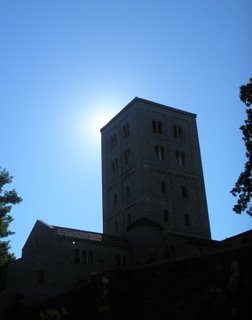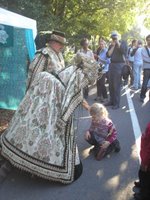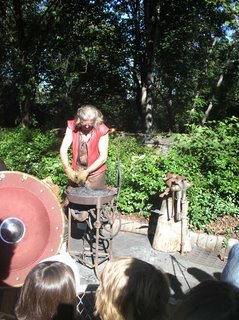
So a few weekends ago -- and I must apologize for the delay in blogging this, between the Medieval Guild Conference last weekend and the symposium on early Bibles ( In the Beginning) this weekend in DC at the Freer and Sackler Galleries, I've been a pretty busy Anglo-Saxonist graduate student -- I attended the lovely Medieval Festival in Fort Tryon park at the northern edge of Manhattan.
The Cloisters is one of my favorite places to do work -- it's a safe bet, on a quiet Saturday or Sunday, you'll find me up there, grading papers, enjoying the peace that only a medieval cloister can bring. And there is a strange, pleasant feeling of solitude that comes with being in the cloisters, and working there as opposed to in my apartment or at the library. It's lovely.
But this weekend, Fort Tryon park was anything but quiet, and my normally serene Cloisters were mobbed with people experiencing what they seemed to think of as "The Middle Ages" -- a kind of escape from modern realities complete with ironworking --
not to mention, knighting ceremonies complete with a king and queen to perform them --

and if you don't think I was jealous of the little girl above, who was being knighted Sir Gareth, think again.
However, the whole thing raised among my friends and I -- þam Flowendegiedum (a fellow Anglo-Saxonist) and one of my other colleagues and dear friends whom I shall call LateMedievalist -- some interesting questions that I for one have no idea how to answer. Now, I have no problem with people who participate in historical re-enactment, SCA or the like (though I tend to find the whole thing a bit dubious, there's a part of me that wouldn't mind dressing up and pretending again, as I was quite into make-believe as a child and have never found quite that sort of forum for my quite underused imagination). However, LateMedievalist brought up a really interesting point about all of this dressing up -- i.e., that everyone dresses up as a knight, or a lady, or a king.
Nobody is willing to play the serfs, and god knows the grand majority of us would have fallen into that category. The non-noble characters present often were dressed in what Flowendegiedum diplomatically called "Ale-House Wench Aesthetics" and I, less generously, referred to as "The Medieval Skank." Rich costuming and half-dressed women.
So what kind of Middle Ages are they embracing? It almost certainly isn't the "Real" Middle Ages, though I'd imagine we're all old enough to admit we're never going to find that one. Yet, what it is it about this fantasy of the lives of lords and ladies that's so deeply appealing to so many? What is it about that opulent world that makes us want to be a part of it? Is it the simple myth that life was better "back then"? That the past was somehow better than the always difficult and always frightening present?
I've always admired the film "The Lion in Winter" for its stark portrayal of the Angevin Henry II Plantagenet and his queen, the incomparable Eleanor of Aquitaine (played to startling perfection by Peter O'Toole and Katherine Hepburn). The opulence of the medieval aristocracy is quite clear in the film -- not quite as gold laden or frilly as the movie Marie Antoinette (which I saw this evening, and which is another post entirely), but still endlessly rich and extravagant. And heartwrenching. Perhaps they are pawns of fate and power and the times, but Henry and Eleanor are pitiable in their glory. Eleanor herself sums it up for me, speaking to her sons near the end of the film:
It's 1183 and we're barbarians! How clear we make it. Oh, my piglets, we are the origins of war: not history's forces, nor the times, nor justice, nor the lack of it, nor causes, nor religions, nor ideas, nor kinds of government, nor any other thing. We are the killers. We breed wars. We carry it like syphilis inside. Dead bodies rot in field and stream because the living ones are rotten. For the love of God, can't we love one another just a little - that's how peace begins. We have so much to love each other for. We have such possibilities, my children. We could change the world.
We have such possibilities. We could change the world. The limited-ness of the medieval artistocracy and particularly of the medieval monarchy seems so clear in Eleanor's words in the movie. Written hundreds of years later, The Lion in Winter seems to get to the heart of certain matters, not least of which was how unromantic the Middle Ages can be. What was striking about the medieval festival was how that vision of the medieval was lost. In the modern Renaissance Faire, we can all be lords and ladies, there is no plague, war is a simple game and the past is resplendant in all its finery.
But I wonder what one could find at the core of it all. And I wonder what it would change about the way we perceive modernity, if the medieval wasn't quite what we picture it as. If there were serfs and peasants -- and if the aristocracy wasn't quite so glorious after all.




5 comments:
don't forget The Society for Creative Anachronism.
scribal arts!
An interesting point about our romanticizing (itself a problematic term) of the Middle Ages through re-creation (and, I guess, recreation).
But the Jorvik Viking Center in York, England, does, for the record, stink. Historical diligence, or a tendency of earlier medievalists to empathize (in surround smell) with the downtrodden?
Since I took long and serious work writing up the original version of this post, only to have it lost in the ether I shall try again. be warned it is far earlier in my morning (to a given value of morning) than the last one.
I've always had this kind of dread facination with US re-enactment. And I think the reasons are very similar to the areas you've mentioned. Growing up in the UK with family who were involved in several re-enactment societies from Dark Age to Civil War I am happy to reassure you there is real re-enactment out there. You don't have this focus on the great and the good swanning around. Your emphasis is on the everyday life. And on the warfare because lets face it a lot of the time it draws the crowds. But when you might have a huge number of Norse and Saxon warriors in big shieldwalls being the afternoon special, the meat of the event would be the Living history aspect. In fact the Norse re-enactment society I grew up in would not let people be full members unless they could demonstrate at least one craft that they could base their existence in that Dark Age settlement around. Hence my father is a very accomplished bronze smith and my mother is not only a rather good herbalist but can also spin, tablet weave and most of the other occupations you might need. Heck I wasn't allowed in front of the public as a child till I could demonstrate a range of Dark Age childrens games.
My hero was a guy called Stuntie (oddly enough an Anglo-Saxon Phd student, as me what he did for his dissertation some time) who specialised in being able to pray the christian priest in any setting.
Ah and the holy shrine of Jorvik, held up as some form of pinacle of historical recreation. Sadly it's looking a little shabby these days. my only defence of the place is that it, like many things, was great at the time.
Hmmm...there's a thesis just there on how our presentation of living history has evolved.....
I guess the big question is, what's the value of living history? I personally, (as I'm sure you could have guessed), ADORE living history: one of my life goals is to be a costumed "interpreter" at Plimoth Plantation. But the reason I like it has not very much to do with wanting to learn and a lot to do with wanting to be someone else for a while. And my guess is, that's what it is for a lot of people. I think it's the same fascination that draws people to role-playing games.
Why are we so eager to shed this mortal coil and jump into another one? I couldn't tell you, but I guess it's probably because we're bored and watching episode after episode of Project Runway just isn't cutting it anymore.
Carolyn -- The day they let me learn how to illuminate manuscripts will be a happy, happy day. SO long as they're animal friendly...
ljs> No kidding on the romanticizing bit. You know from many of our conversations how interested I am in that history as actually belonging to one's self (in as far as history can, of course) -- so more accurately, being able to self-identify with the Middle Ages? I don't know, all I know is we dont have that here in the US and i want it!
Flowendegieddum -- Well, yes, definitely bored by Project Runway. But I wonder if it's that "the past was more real" tendency, the Huizinga-esque "Violent Tenor of Life"-- "To the World when it was half a thousand years younger..." and all that (god do I love The Waning of the Middle Ages, for all its many flaws.
Tom> Thank god there are REAL medieval re-enactors out there. I'm fascinated by that idea -- you realize at some point during your visit I will attack you and force you to tell me all about it, right? So long as we're clear. :) And thank you for re-writing the post. Definitely worth it, to hear there's hope for re-enacting as an actual Living History enterprise.
As for the value of Living History -- well, I wonder though. At the end of the day, we can leave -- no matter how bad it gets, we can always walk away. I wonder what it was like to actually be stuck there, in those "Dark Ages," with no way out but death.
I promise, I'm not always this uplifting.
Post a Comment